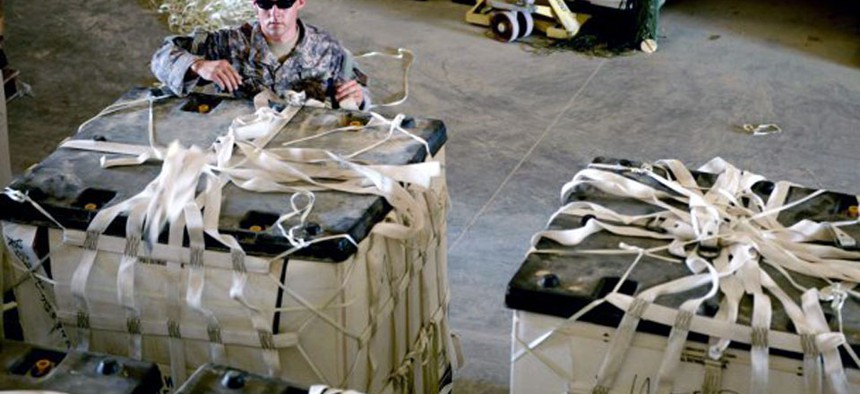Australia Joins Iraq Refugee Aerial Resupply Mission

U.S. Army parachute riggers from the 11th Quartermaster Company, 264th Combat Sustainment Support Battalion, 82nd Sustainment Brigade, palletize water for a humanitarian air drop, Aug. 6, 2014, to displaced Yezidis in the vicinity of Sinjar, Iraq. U.S. Army
Packing meals for airdrop like giant game of Tetris
Australia has joined the United States and Britain in airdropping supplies to refugees trapped by the Islamic State of Iraq and the Levant forces on Mount Sinjar in Northwestern Iraq, with a Royal Australian Air Force C-130J parachuting 10 pallets of supplies yesterday.
Over the past week, U.S. military aircraft have delivered more than 114,000 meals and more than 35,000 gallons of fresh drinking water, providing much-needed aid to the displaced Yazidi refugees trapped on the mountain. This help includes two C-17s that dropped 7,608 gallons of bottled water yesterday and 14,112 meals ready to eat.
Rear Adm. John Kirby, Pentagon press secretary, today said that "based on our assessment of conditions on the mountain that it is much less likely that we'll need to continue to airdrop any more food and water."
He said there are now 4,000 refugees on the mountain; 1,500-2,000 of those are locals who have no plans to leave.
Australian Prime Minister Tony Abbott said the RAAF C-130J flying from a base in the United Arab Emirates yesterday parachuted 150 boxes of high-energy biscuits and 340 boxes of bottled water onto Mount Sinjar -- enough to sustain 3,700 people for 24 hours.
The United Kingdom has conducted two drops of food and water to Mount Sinjar since Sunday. Its Department for International Development said future supply missions will include reusable filtration containers filled with clean water, tarpaulins and basic shelter equipment, and solar lights that can also recharge mobile phones.
The MREs are placed into a container delivery system, which consists of cardboard containers placed on a dampening material called a honeycomb. The supplies are tied together with webbing and fixed to a self-deploying parachute. These one-time-use containers are designed to be quickly opened to deliver supplies as fast as possible after they are dropped from cargo aircraft.
Teams from the Army 11th Quartermaster Company deployed to bases in the Mideast package the meals for the airdrops, a process that on a large scale mimics the Tetris computer game. The most challenging portion of the operation is placing the MREs on the pallet, said Army Spc. Jonathan Echaves.
"It's like playing Tetris,” he said.
An entire aircraft's worth of meals and water exit the plane less than 10 seconds. The three aircraft on an Aug. 8 mission were able to drop their cargo in less than 15 minutes.






